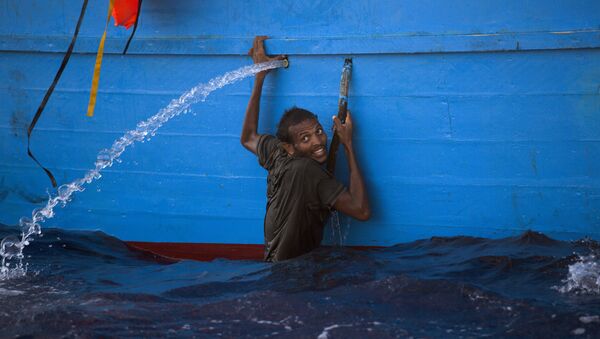More than 2,200 people were rescued in rubber dinghies, small boats and one large vessel as part of 16 rescue operations over the weekend, the Italian coast guard said, while ten bodies had been recovered.
The rescue mission has once again drawn attention to the risk involved with migrants crossing the Mediterranean in the hope of reaching Europe, as people looking to flee Africa or the Middle East continue to try and reach Italy.
#SAR Italy keeps on working for #Refugees
— Sebastiano Cardi (@sebastianocardi) October 27, 2016
993 #migrants rescued today in the #Mediterranean in 8 operations coordinated by @guardiacostiera pic.twitter.com/hxpHzahedF
The weekend's rescue mission also comes after the UN's International Organization for Migration (IOM) revealed that 4,200 people have either died or gone missing while trying to cross the Mediterranean this year, surpassing figures from previous years on record.
Migrant deaths at sea near deadly milestone of 4,000 — latest @UNmigration @MissingMigrants update https://t.co/yTABkAZIhq pic.twitter.com/g9upGkNuKX
— United Nations (@UN) November 3, 2016
Of those deaths, 3,743 came along the central Mediterranean route between Libya and Italy, 415 along the Turkey-Greece/Cyprus route while 62 people died trying to reach Spain.
Bad Weather, Tragedies and Smugglers
While the EU-Turkey migration deal has seen the number of arrivals to Europe by the Mediterranean more than halve, the death toll is higher than the whole of last year, when 3,700 people lost their lives trying to cross the Mediterranean.
"The increase in the number of victims compared to last year is linked to two different factors," said Federico Soda, director of the IOM's coordination office for the Mediterranean.
"First, there were three large shipwrecks at the end of April and May, which affected hundreds of people who were traveling on three flimsy boats. These caused almost 1,400 deaths."
Utterly reprehensible! And news this morning is 239 more #migrant deaths in Med bringing gruesome total in 2016 to 4220. In all 2015 — 3770. https://t.co/xty0NLBuHN
— Itayi (@itayiviriri) November 3, 2016
"October is generally a month of bad sea conditions, which inevitably causes more incidents. In Italy, we saw a new record for arrivals in October — 27,388 this year, compared to 8,915 in 2015 and 15,264 in 2014. With a larger number of boats, there is also a higher risk of shipwrecks," he added.
IOM Italy spokesperson Flavio Di Giacomo, said that other factors have also contributed to a late rush in migrant and refugee arrivals in Europe.
"The migrants who reach Italy have been telling us that smugglers have been telling them that the Libyan Coast Guard is being trained to carry out more rescues at sea. In a couple of months migrants who choose to undertake the sea crossing will be more likely to be rescued by the Libyan Coast Guard and brought back to Libya."
A grim milestone in the #refugeecrisis: @UNmigration reporting that #migrant deaths at sea near 4,000 in 2016. https://t.co/fk9k5SyxjV pic.twitter.com/lh20s1mx7X
— Refugees Internat'l (@RefugeesIntl) November 2, 2016
Di Giacomo added that this was pressuring people to feel they should rush to depart for Europe as soon as possible.
"Basically migrants do not want to be taken back to Libya, where they risk falling back into the vicious cycle of violence and abuse that they are fleeing."
EU Divided on Migration Crisis
The high number of migrant deaths on the Mediterranean has also highlighted the EU's inability to agree on a unified policy to deal with the crisis, with significant divides across the bloc.
While Germany and others, including the European Commission, have supported plans to implement a refugee quota system to relocate refugees currently in camps in Italy and Greece, other member states such as Hungary, Slovakia and Poland have flatly rejected such offers, arguing that national governments, and not the European Commission, should control policies relating to immigration.
EU divided on migration far too long. Finally building synthesis of two great needs: security at our borders & openness/tolerance
— Donald Tusk (@eucopresident) April 13, 2016
The spat has led to various threats across the bloc, with Italian Prime Minister Matteo Renzi threatening to bloc EU funds for countries that do not take part in helping with the resettlement of refugees across the bloc.
The ongoing crisis and lack of consensus among member states has even led to reports that German officials are considering introducing sea patrols that would intercept refugees and migrants and take them to third countries to be processed.


